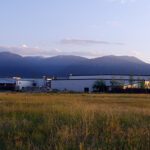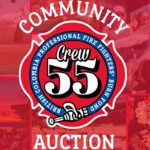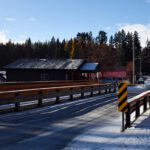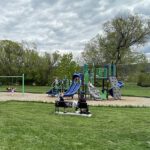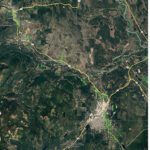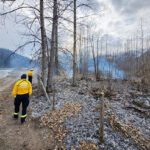Home »

Opposition leader urges voters to maintain status quo
Official Opposition Leader Andrew Wilkinson (BC Liberal Party) toured through the East Kootenay this past week to discuss Proportional Representation (Prop-rep) and electoral reform with business and community leaders.
His message to the Cranbrook Chamber of Commerce Sept. 19 was clear; if rural B.C. residents wish to maintain local representation in Victoria, vote to maintain the current ‘first-past-the-post’ system in the upcoming referendum.
Registered voters will get a voting package for the 2018 Referendum on Electoral Reform in the mail between October 22 and November 30.
“The beauty of the current system is if you have a concern about provincial politics or you just have something to gripe about, you know who your rep is. And if you like him or her you re-elect them and if you don’t, you kick them out. They are totally accountable to you and your community.

“As you know, Cranbrook is dominant in this riding – so if you have an accountability problem you know who to talk to and you know (they) know the issues and if they don’t, they better learn it real fast or you will have something to take up with them, whether it is election time or next week.”
Accountability is what is missing in how the upcoming referendum has been approached by the ruling NDP government, Wilkinson said.
A Citizens’ Assembly in 2004 came up with “a simple yes/no question” that appeared on the 2005 ballot and was defeated. It was on the ballot again in 2009 “but defeated thoroughly, Wilkinson recounted, “because people like the current system more than the proposed system. And that was that and then along came the 2017 election.
“During the election John Horgan said three basic principles were going to change the electoral system. First is the simple yes or no question. The second is there has to be another Citizens’ Assembly, which made a lot of sense because the first one was very successful, very respected, actually around the world. And number three there has to be regional thresholds, so you can’t have Vancouver impose its decision on all the rest of British Columbia. All three of those promises have been badly broken by the NDP.
“Last November we sat through a Legislative session where the Greens and NDP force fed down electors throats there would be no Citizens’ Assembly, a complicated ballot and no regional threshold at all. They passed the law saying that if 50% plus one of the people who vote, vote in favour of change, then change must be implemented. So if the turnout is tiny, like 20 or 30% of the population and 50% plus one of them vote to change it, it must be changed.
“What brought about this change? Why is this happening this way? It seems kind of strange and it is all being done very quietly.”
Wilkinson said the current soiree into potential electoral reform came about when the Green Party captured three seats in the last provincial election.
“The NDP needed the Greens. The Green Party’s approach was to say ‘we’ll just put it to a vote in the legislature to change to prop-rep; it will be 44 to 42 and we will win as the Green Party because it will guarantee us seats for life. And on top of that we’ll never have to raise any more money because we get taxpayers’ money give to us to directly now because of another NDP law.’ So the Green Party said ‘we want prop-rep as soon as possible. John Horgan, you have to just vote this through the legislature and that will be a great thing for British Columbia.’
“Now, lots of people disagreed with that so, Horgan, to his credit, said, ‘no we are going to have a referendum.’ But the process through the legislature was pretty appalling. We said, ‘bring the proposed question from the legislature; air it in public, let’s find out what’s going on.’ The answer was ‘nope.’ We moved for an emergency debate on this, they voted it down. So what we get is the question, the process in the entire timeline, the funding, it’s all been decided by the NDP cabinet of 20 people behind closed doors with no public involvement and no scrutiny, at all.
“And this is about changing the fundamentals of our democracy. So we’ve got a lot of problems with this.
“It’s the most complicated ballot that’s even been used anywhere in the world for this topic. It lays out three different options: DMP (Dual-Member Proportional Representation); RUP (Rural-Urban Proportional Representation); and MMP (Mixed-member Proportional Representation). And you’re supposed to learn what those are. The formulas behind them will not be disclosed. We asked repeatedly and the media asked repeatedly, ‘how about maps showing what the new ridings would look like? So people would get a sense of how it would work; that’s what was done in 2005 and 2009. The NDP refused; no maps! Just take our word for it and we’ll work out all those details later. Just vote for one of these three; just pick one and we’ll tell you the details later, after you’ve voted for it.”
Wilkinson related a story about recently speaking with someone in Williams Lake who questioned him about what ridings would look like under prop-rep.
“The fundamental thing, for us, that really makes us bothered by this is when you look at the practicalities. In British Columbia, north of Cache Creek, is two-thirds of the province and 300,000 people, which is about seven per cent of the population. So under proportional representation you get great big ridings so you can elect multiple people. That probably means that there will be one riding for everything from Cache Creek north. That’s an area bigger than France. And you can imagine the diversity of interests between Fort St. John and Prince Rupert. They don’t have an awful lot in common, whether it’s climate or attitudes or landscape or anything else,” he said.
Concluding his story, he said it is unlikely Williams Lake may ever have a MLA again, as they will come from the larger centres, such as Prince George. “Because a couple of the MLAs in these large, large ridings will be selected by their name. Most of them will be selected by the party bosses after the election, which is how prop-rep works. So Vanderhoof and Fraser Lake, they have their own riding in Netchako; they’ll never have a MLA again. Stikine, which is based around Smithers and is a huge area right up to the Yukon border, they’ll never have a MLA again.
“And we were in Kimberley yesterday and it kind of goes through your mind and you think, ‘they’ll never have a MLA again. Kimberley, Invermere, Golden, Revelstoke; forget it, because this area would be mashed in. How far doe you have to go to find 300,000 people from here in British Columbia? That’s all four of the ridings that add up to about 160,000 people. Then you’d have to add on either the Penticton riding or maybe right up to the Shuswap. And if you get globbed in with Kelowna, I think you know what is going to happen. So this is an issue that is very, very important for areas like this.
“I don’t think of Cranbrook being rural – at all. You have a major airport; a full-on, full service hospital; you are the regional service centre. And the idea that you can be cut out of influence in Victoria by any kind of voting system, really goes up my nose.
“So we come back to asking, ‘who wants this?’ Why is this a good idea? To keep the Green Party happy; keep the NDP coalition on us for a long, long time; So I urge you to form an opinion on this,” Wilkinson stated.
The current electoral system “has worked in British Columbia since 1871. It’s worked in Canada since well before 1867; it’s worked in Britain for 200 years. So who is asking to change this? Why are we turning this over and they will come up with arguments like ‘we’re going to make every vote count.’ That is just absolute nonsense, because somebody has to form the government,” he said, pointing at the recent Swedish election, which resulted in an ultra-right wing group seizing a position of power. Another election is a likely result.
“Prop-rep leads to unstable, coalition governments that drive up costs,” he said. “We can’t see an upside to proportional representation in British Columbia. This is a very big and very diverse place.”
Governance in the past in B.C. has worked because the parties elected to power have to represent the entire province, Wilkinson told the Heritage Inn audience.
Prop-rep would result in more politics, not less, Wilkinson said.
Once a prop-rep election is held, the parties involved would hunker down and horse trade, possibly for months, he said, and that could eradicate most election promises.
“This is voting for parties, not for people. It’s not electing a candidate, it’s electing a party boss. And allowing a party boss to go behind closed doors and secretly work out the agenda that is supposedly good for B.C.”
Wilkinson urges voters to pay attention to their mail following the Oct. 20 municipal elections as Elections BC will be distributing prop-rep referendum ballots to every eligible voter in households.
“You can well imagine what will happen at community mail boxes and the big apartment boxes in Burnaby. The trashcans are going to be full of these things. This is really, really a bad thing. So even if you are a fan of prop-rep, please save the ballots. You have until Nov. 30 to mail them so there is a five-week window where you can exercise this very important function.”
Confusing wording of the question and general public misunderstanding of the process is not helping, Wilkinson said.
“Can anyone in this room explain the difference between DMP, RUP and MMP?” He asked. No one stepped forward.
“No where in British Columbia, aside from a few semi-academic circles, does anyone understand what they are being asked to vote for. The ballot itself will have the first line saying ‘do you support current system of first-past-the-post?’ Ninety per cent of our population do not pay attention to what that is,” he said, suggesting the question should have simply been do you support electoral change – yes or no?
“This is not a priority for most people, to sit down and try to figure out the difference between DMP, RUP and MMP. The NDP has set this thing up to be confusing.”
The NDP government also established red tape to limit the Official Opposition’s ability to reach the public, he added, noting if one wishes to hold an event to educate the public they have to register beforehand with Elections BC.
“This is so undemocratic. I think this just stinks; that’s my perception of it. They want to change the whole system but they want to restrict your ability to talk about, at the same time.”
Learn more about the referendum
Lead image: Andrew Wilkinson, Official Opposition leader and Vancouver-Quilchena MLA, speaks with Cranbrook Chamber of Commerce members following his Sept. 19 talk. Ian Cobb/e-KNOW photo
– Ian Cobb/e-KNOW

